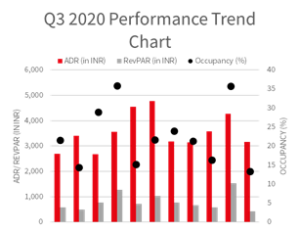
India’s hospitality industry has witnessed a decline of 52.8% in Revenue Per Available Room (RevPAR) during January to September (YTD Sept) 2020 over the same period last year due to the impact of Covid-19 pandemic, according to JLL’s Hotel Momentum India (HMI) Q3 2020, a quarterly hospitality sector monitor. Overall, in inventory volume, the brand signings declined by 19% in Q3 2020 over Q3 2019, however international operators signed a greater number of keys than domestic ones.
All key 11 markets in India reported a decrease in RevPAR Performance in Q3 2020 over the same period last year. Mumbai continues to be the RevPAR leader in absolute terms, despite the decline of RevPAR by 71.7% in Q3 2020 compared to Q3 2019 whereas Bengaluru saw the sharpest decline in RevPAR in Q3 2020, with 88.1% decline compared to the same period in the previous year.
According to the findings of HMI Q3 2020, international operators dominated signings over domestic operators with the ratio of 53:47 in terms of inventory volume. Demand in leisure destinations began seeing weekend occupancy spikes as the lockdown restrictions were further lifted in August.
Source: STR
Other cities such as Pune (86.2%), Kolkata (82.6%) and Goa (78.8%) also witnessed sharp declines in RevPAR.
 “Investors are taking interest in exploring operational hotel opportunities both in business and in leisure locations. With the phased unlocking of the economy in the third quarter of 2020, we are witnessing gradual growth in demand particularly in leisure market with weekend occupancy spikes”, says Jaideep Dang, Managing Director, Hotels & Hospitality Group (India), JLL.
“Investors are taking interest in exploring operational hotel opportunities both in business and in leisure locations. With the phased unlocking of the economy in the third quarter of 2020, we are witnessing gradual growth in demand particularly in leisure market with weekend occupancy spikes”, says Jaideep Dang, Managing Director, Hotels & Hospitality Group (India), JLL.
A total number of signings in Q3 of 2020 stood at 24 hotels comprising of 2,314 keys recording a decline of 19% compared to the same period last year. The Reserve Bank of India (RBI) has announced de-linking hotels from commercial real estate enabling hotels to seek capital loans from banks and ease out liquidity issues, especially for new hotel projects.



